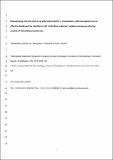Files in this item
Repurposing the anti-viral drug zidovudine (AZT) in combination with meropenem as an effective treatment for infections with multi-drug resistant, carbapenemase-producing strains of Klebsiella pneumoniae
Item metadata
| dc.contributor.author | DeSarno, Alexandra E | |
| dc.contributor.author | Parcell, Benjamin John | |
| dc.contributor.author | Coote, Peter John | |
| dc.date.accessioned | 2021-10-13T23:43:39Z | |
| dc.date.available | 2021-10-13T23:43:39Z | |
| dc.date.issued | 2020-10-14 | |
| dc.identifier | 270640316 | |
| dc.identifier | 77891074-bf28-49c1-a266-56b78037e136 | |
| dc.identifier | 85097967975 | |
| dc.identifier | 000604498400002 | |
| dc.identifier.citation | DeSarno , A E , Parcell , B J & Coote , P J 2020 , ' Repurposing the anti-viral drug zidovudine (AZT) in combination with meropenem as an effective treatment for infections with multi-drug resistant, carbapenemase-producing strains of Klebsiella pneumoniae ' , Pathogens and Disease , vol. Advance Article . https://doi.org/10.1093/femspd/ftaa063 | en |
| dc.identifier.issn | 2049-632X | |
| dc.identifier.other | ORCID: /0000-0001-5190-805X/work/83481752 | |
| dc.identifier.uri | https://hdl.handle.net/10023/24137 | |
| dc.description | Funding: University of St Andrews. | en |
| dc.description.abstract | Multi-drug resistant (MDR) Klebsiella pneumoniae represent a global threat to healthcare due to lack of effective treatments and high mortality rates. The aim of this research was to explore the potential of administering zidovudine (AZT) in combination with an existing antibiotic to treat resistant K. pneumoniae infections. Two MDR K. pneumoniae strains were employed, producing either the NDM-1 or KPC-3 carbapenemase. Efficacy of combinations of AZT with meropenem were compared with monotherapies against infections in Galleria mellonella larvae by measuring larval mortality and bacterial burden. The effect of the same combinations in vitro was determined via checkerboard and time-kill assays. In vitro, both K. pneumoniae strains were resistant to meropenem but were susceptible to AZT. In G. mellonella, treatment with either AZT or meropenem alone offered minimal therapeutic benefit against infections with either strain. In contrast, combination therapy of AZT with meropenem presented significantly enhanced efficacy compared to monotherapies. This was correlated with prevention of bacterial proliferation within the larvae but not elimination. Checkerboard assays showed that the interaction between AZT and meropenem was not synergistic but indifferent. In summary, combination therapy of AZT with meropenem represents a potential treatment for carbapenemase-producing MDR K. pneumoniae and merits further investigation. | |
| dc.format.extent | 1787140 | |
| dc.language.iso | eng | |
| dc.relation.ispartof | Pathogens and Disease | en |
| dc.subject | Klebsiella pneumoniae | en |
| dc.subject | Galleria mellonella | en |
| dc.subject | Wax-moth larvae | en |
| dc.subject | Combination therapy | en |
| dc.subject | NDM1 | en |
| dc.subject | KPC3 | en |
| dc.subject | QR Microbiology | en |
| dc.subject | RM Therapeutics. Pharmacology | en |
| dc.subject | 3rd-DAS | en |
| dc.subject.lcc | QR | en |
| dc.subject.lcc | RM | en |
| dc.title | Repurposing the anti-viral drug zidovudine (AZT) in combination with meropenem as an effective treatment for infections with multi-drug resistant, carbapenemase-producing strains of Klebsiella pneumoniae | en |
| dc.type | Journal article | en |
| dc.contributor.institution | University of St Andrews. Infection and Global Health Division | en |
| dc.contributor.institution | University of St Andrews. School of Medicine | en |
| dc.contributor.institution | University of St Andrews. Biomedical Sciences Research Complex | en |
| dc.contributor.institution | University of St Andrews. School of Biology | en |
| dc.identifier.doi | 10.1093/femspd/ftaa063 | |
| dc.description.status | Peer reviewed | en |
| dc.date.embargoedUntil | 2021-10-14 |
This item appears in the following Collection(s)
Items in the St Andrews Research Repository are protected by copyright, with all rights reserved, unless otherwise indicated.

